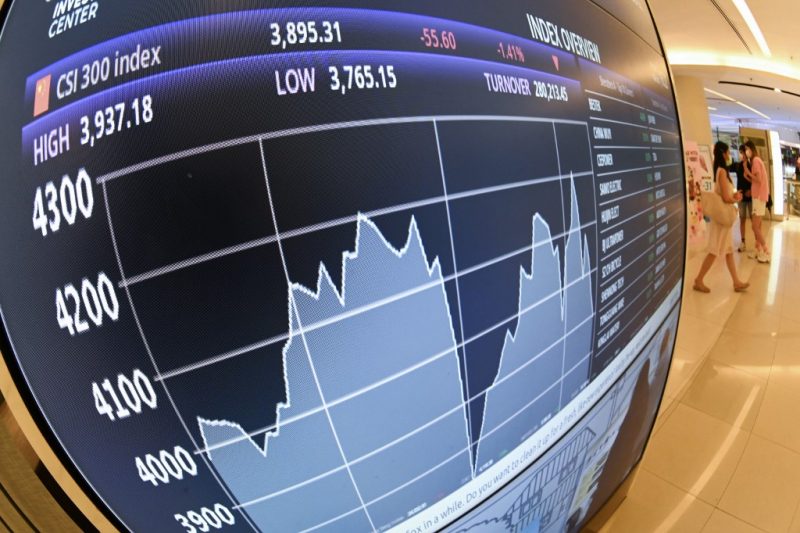Asia’s major markets were on the front foot on Thursday with Chinese property firms enjoying a much-needed lift – even the ailing China Evergrande saw a 4% jump – after fresh easing measures were unveiled by the country’s central bank.
Signs that Beijing was on a new monetary easing course also provided some crucial support to the tech giants who have been hammered in recent months, caught in the clutches of a wide-ranging, private-sector clampdown.
The People’s Bank of China on Thursday lowered a key bank lending rate for the second time in as many months, days after slashing its policy rate for the first time since the pandemic struck.
The move was the latest aimed at boosting the world’s number two economy, which has been crippled by lockdowns to stem fresh Covid outbreaks as well as a sharp slowdown in the vast property sector, a key driver of growth.
Also on AF: China Population May Shrink This Year: Bank Of America
Chinese property firms will be among the biggest winners as the easing improves their chances of accessing much-needed funds to repay monumental debts that have threatened their future and raised concerns of contagion in the broader economy.
Hong Kong’s Hang Seng Index – one of the worst performers in the world last year – rallied more than 3% thanks to a surge in tech giants including Alibaba, Meituan, Tencent and JD.com, while property firms also enjoyed healthy gains.
China Evergrande, which has been teetering for months, was up more than 4%, while Sunac added more than 15% and Country Garden gained more than 4%. Shanghai, however, was unable to maintain early gains and ended slightly lower.
The Hang Seng Index surged 3.42%, or 824.50 points, to 24,952.35. But the Shanghai Composite Index fell 0.09%, or 3.12 points, to 3,555.06, while the Shenzhen Composite Index on China’s second exchange lost 0.92%, or 22.44 points, to 2,419.69.
However, the market mood remains grounded by concerns about the US Federal Reserve’s monetary policy plans as it battles soaring inflation, which has been stoked by a cocktail of surging demand, supply chain snarls, rising wages and a spike in energy prices.
Nasdaq The Big Loser
Speculation is now growing that the US central bank will have to lift interest rates four times or more this year.
Some analysts are tipping a 50 basis-point hike in March, the first such move since 2000, while the bank has also said it plans to offload the bond holdings on its books that have helped keep costs down.
The inevitable end of the era of ultra-cheap cash – which helped fuel a near two-year equity rally and economic rebound – has weighed on global markets for months.
While some have managed to eke out record or multi-year highs, analysts warn that the next few months could see some fluctuations.
One of the main losers has been the Nasdaq on Wall Street, which on Wednesday fell into a correction – a decline of greater than 10% from its most recent peak – as tech giants are more susceptible to higher borrowing costs.
Oil Markets Slip
The Dow and S&P 500 have also suffered but Asia fared much better. Tokyo, Singapore, Sydney, Seoul, Bangkok and Jakarta also rose but Taipei, Manila, Wellington and Mumbai were down. London, Paris and Frankfurt also rose at the open.
The benchmark Nikkei 225 index added 1.11%, or 305.70 points, to 27,772.93, while the broader Topix index gained 0.98%, or 18.81 points, to 1,938.53.
Oil markets slipped after a strong run-up this week on the back of expectations for improved demand as economies reopen and as unrest in the crude-rich Middle East sparks supply concerns.
The International Energy Agency lifted its forecast for 2022 consumption to 99.7 million barrels per day, above the pre-Covid level.
Both main contracts are also homing in on the $90 mark, having broken to seven-year highs earlier in the week, while some commentators are predicting Brent could bust past $100 next year.
Key figures around 0820 GMT
Tokyo > Nikkei 225: UP 1.1% at 27,772.93 (close)
Hong Kong > Hang Seng Index: UP 3.4% at 24,952.35 (close)
Shanghai > Composite: DOWN 0.1% at 3,555.06 (close)
London > FTSE 100: UP 0.3% at 7,610.25.
New York > Dow: DOWN 1.0% at 35,028.65 (close)
- AFP with additional editing by Sean O’Meara
Read more:
China Lowers Key Policy Rates to Prop Up Slowing Economy
Bondholders Could Sue Evergrande Over Lack of Engagement
























